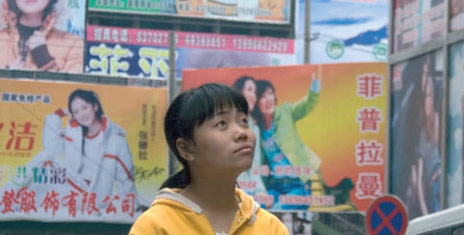
February 29, 2012, by ICCSR
Up the Yangtze
Take a “Farewell Tour” up the Yangtze river on board a luxury cruise ship and marvel at the dramatic sights, sounds and cultures of China New and Old. Stand at the foot of the magnificent hydroelectric Three Gorges Dam – an icon of the Chinese economic miracle – and contemplate the sheer scale and speed of national development and prosperity. Here, the waters of the Yangtze rise as fast as the Chinese dream unfolds around you, giving you the chance to catch a last glimpse of the legendary Old China, its traditional people and ways. You can say that you were there when they said farewell to Old China.
Refreshingly devoid of polemic narrative (unlike other overly earnest documentaries), last night’s film screened at Broadway Cinema – Up The Yangtze – drew the audience into a world of tensions, contradictions and mixed feelings that centred on the lives of people profoundly affected by the Three Gorges Dam development. The Dam will provide much needed renewable energy for a nation heavily dependent on coal, whilst at the same time forcing thousands to leave their homes. At the centre of the story was Cindy (her given English name) whose family has scratched out an existence by subsisting on the banks of the Yangtze. Now forced to leave their home (a stove surrounded by loosely assembled boards), by the rising Yangtze waters, Cindy is asked by her parents to take a job on board the luxury cruise boat Farewell Tours; i.e. she earns money from the very event that is about to engulf her family home and force her to work. You really couldn’t make this stuff up!
The film was beautifully shot and whilst clearly edited to an agenda, contained some moments of pure honesty, where Cindy broke down in tears at her desperate situation and (though more humorous) when a wealthy tourist congratulated, and then tipped, her Chinese guide for “not being too overbearing”. The film left the audience, and indeed me, with mixed feelings, about the transformative nature of tourism and how to manage the positive and negative impacts of modernisation – such as renewable energy and enforced social migration. Moreover, it provoked the question of how much the Chinese economic, social and political context shaped the key issues in the film where, as one character put it; “the small family has to make a sacrifice for the big family”.
Thankfully Richard Pascoe, consultant to the China Policy Institute at the University of Nottingham, was on hand to give some clarity to the tensions addressed in the film. In providing a history of shifting economic, social and political events in China over the last thirty years it quickly became apparent (apart from how little we knew about China) that there is a general will to transform the welfare of the Chinese population. Millions have indeed been lifted out of poverty. However, managing this transformation on such a large scale and in such a short space of time are ‘special conditions’ unique to China. Richard reminded us that for the massive population of China, the industrial revolution has only happen over some fifteen or so years! Other nations took centuries, involved numerous wars, used forced labour (e.g. children) and destroyed irreplaceable cultural and ecological resources. Richard also identified various sources for positive change, specifically through local protest, sharing of information (via the internet), the family unit, as well as more global level forces such as NGOs and political and financial institutions that fund and shape China’s miraculous development. Given what they have achieved economically in such as condense time period, imagine what they could do in both social and environmental terms in the next fifteen years…
for more on this see Richard’s post
By Dr Robert Caruana, Lecturer in Business Ethics, ICCSR Nottingham University Business School
Image sourced from www.uptheyangtze.com

For those who are intereted in supporting Yu’s Family, please refer to the web site and find the link to donation page. (http://films.nfb.ca/up-the-yangtze/index.php)
Thanks to ICCSR give us great opportunity to understand ongoing CSR issues. I especially appreciate we have addressed China-related one, especially ethical dilemma China is currently facing with amazing summerize by Richard. It may be problematic and controversial area, but I agree that things are changing and sometimes even better. As CSR people, it would worth paying attention to those two side of signals of the areas where are less comprehended in western society.
Interesting! I’ll be the first to admit I often get engrossed by a utrdmenoacy as I’m channel surfing past something…I was watching a great one on CBC called Radiant City all about human geography and urban planning and the rise of suburbia.I think Up the Yangtze played at VIFF a couple years ago. In any case, people who are fans of this doc might want to check out the book River Town by Peter Hessler. Hessler writes about his two years as an English teacher at a teachers’ college in Fuling, a town that was later flooded by the Three Gorges Dam project and rebuilt on higher ground.